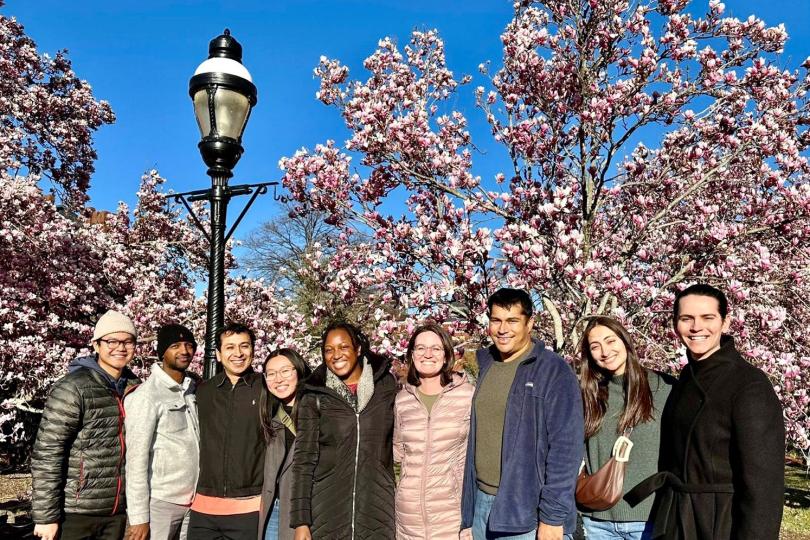Career support
Switzer Fellows have access to career coaching and leadership guidance during their fellowship year and beyond. Staff help fellows identify leadership opportunities and connections within the Switzer Network to support them in their career path.
Other grant programs
After their fellowship year, Switzer Fellows have access to other grant programs aimed at supporting and enhancing their leadership skills and professional development including Leadership grants and Professional Development Fund grants.
Eligibility
- Applicants must be a U.S. citizen, permanent resident, Deferred Action for Childhood Arrivals (DACA) recipient, or a refugee or asylee according to the definition provided by the United States Department of Homeland Security (international students are ineligible.)
- Applicants must be enrolled in an accredited graduate institution in California or one of the six New England states (ME, NH, VT, MA, CT, RI) and plan to be enrolled as for the entire 2026-2027 academic year. Students in online programs are not eligible to apply.
- Applicants must have strong academic qualifications, with academic and career goals focused on environmental improvement.
- Master’s degree candidates (including J.D. students) must have completed at least one semester or quarter of course work to apply, and they must be seeking a Master’s as their terminal degree.
- Master’s degree students planning to pursue a Ph.D. are advised to wait until they are in their Ph.D. program to apply.
- Individuals enrolled in one-year Master’s degree programs may apply prior to enrollment, but must be formally accepted into their program to be eligible for a Switzer Fellowship interview (held in May).
- Ph.D. candidates must have completed at least three years of doctoral work or plan to have passed their qualifying exams by July 1, 2026.
- Mid-career students are encouraged to apply and must demonstrate how their academic program will enhance their effectiveness as an environmental leader.
Fellowship Guidelines and Deadlines
Criteria for selection
Fellowship applicants are evaluated based on their leadership and commitment to environmental problem-solving. Successful applicants also demonstrate commitment and competency to advance social equity as a fundamental part of their environmental problem-solving and clearly articulate how their environmental work affects human communities.
The foundation selects Master's- and Ph.D.-level candidates with a clear vision of how they will apply their skills and experience to practical environmental issues. Ph.D. applicants should have a well defined research focus and be clear about how their academic goals will contribute positive change to applied problems.
Black, Indigenous and students of color, first-generation college students, and individuals from groups traditionally underrepresented in environmental graduate programs are strongly encouraged to apply. We encourage applications from a wide variety of universities, including state universities, in New England and California.
Applications are reviewed using the following criteria. Please see the evaluation rubric for more detail on each of these criteria:
- Environmental commitment
- Applied focus
- Innovative problem-solving
- Leadership potential
- Collaboration and engagement
- Social equity awareness and experience
- Communication skills
Application review process
Each year, twenty fellows are selected from hundreds of applicants.
Application review is conducted in two rounds by Switzer Fellowship alumni, selected to be broadly representative of the Switzer Network by race, gender, educational background, degree program, sector, cohort, and geography. Engaging alumni in this process brings in a diversity of perspectives and involves the network in decision-making.
We track demographic information at the group level through all stages of application review to ensure we maintain representation of groups traditionally underrepresented or marginalized in environmental graduate programs, including Black, Indigenous and students of color, first-generation students, and students who identify as trans or non-binary.
In May, selected applicants meet for a virtual panel interview with Switzer Foundation fellows and representatives. All candidates interviewed are notified of award decisions in writing within two weeks after the interviews.
Deadlines and dates
Applications for 2026 Switzer Fellowships have now closed. Next year's applications will begin being accepted in late October.
Interviews are held virtually in May. Master's degree candidates will be interviewed on Friday, May 8 and Ph.D. candidates will be interviewed on Friday, May 15. Award notifications take place in June.
Fellowship Award Requirements
Attendance at retreats
All fellowship awardees are required to attend two multi-day, in-person retreats in September and March of their fellowship year. Retreats focus on cohort-building, networking, and equity-centered leadership and skills development.
Engagement with the Switzer Network
The foundation expects that all awardees will be active members of the Switzer Network during and beyond their fellowship year. Examples of this include attending or hosting networking events, engaging in listserv conversations, coaching an earlier-career fellow, becoming a member of the Fellows Advisory Committee, or participating in the selection of new fellows.
Use of fellowship funds
The entire grant may be applied to one or more of the following: tuition, matriculation and other university fees, living expenses, education- or research-related expenses. To the extent that the fellowship is not used for these purposes, it may be considered income and the fellow may be liable for income tax.
Reporting
Switzer Fellows are required to submit a brief written report at the conclusion of their fellowship year. An optional interim report will be invited in January.
Exclusions
Employees and trustees of the Robert and Patricia Switzer Foundation and their family members are not eligible to apply. The foundation does not discriminate on the basis of race, color, gender, gender expression, age, disability, religion, sexual orientation, or national or ethnic origin in the selection of fellows.
